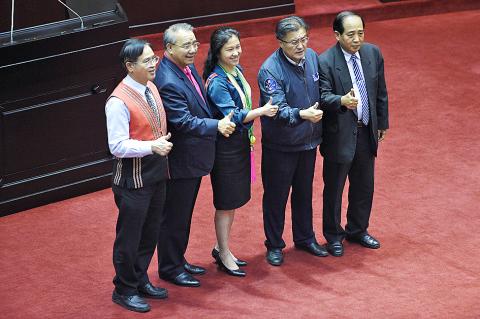The Aboriginal Language Development Act (原住民族語言發展法) yesterday passed its third reading at the Legislative Yuan, granting official status to Aboriginal languages.
Local governments, Aboriginal regions and non-Aboriginal areas with more than 1,500 Aborigines should establish an office tasked with the promotion of local languages, the regulations say.
The act stipulates that the central government should help establish organizations to promote Aboriginal languages, as well as chair meetings with each of the recognized communities to ascertain what new words should be incorporated, assist in compiling Aboriginal dictionaries and establish online linguistic archives.

Photo: Chen Chih-chu, Taipei Times
The primary goal of the policy is to encourage the learning of languages that are nearly extinct, regularly hold polls to gauge language learning, hold free exams and award Aboriginal language certificates, lawmakers said.
Within three years of the act’s promulgation, Aborigines taking civil servants’ special exams and those studying abroad on public funds would be expected to have an Aboriginal language certificate, the act says.
When hiring staff in accordance with the Indigenous Peoples Employment Rights Protection Act (原住民族工作權保障法), the government and public schools should prioritize people who speak Aboriginal languages, it says.
Government institutions, public schools and corporate entities in Aboriginal areas would be required to prepare official documents in commonly used languages of the area, while all public transportation in Aboriginal areas would be required to use the languages in announcements, the act says.
When conducting official business, standing trial in court or during any other judicial procedure, Aborigines would be allowed to use their own language to express themselves, and in such cases the government would have to hire an interpreter, it says.
All schools should follow the curriculum as set out according to the 12-year national basic education and provide Aboriginal language courses, it says, adding that such courses should be taught in Aboriginal languages.
Local education bureaus and departments should launch programs to train full-time Aboriginal-language teachers.
The government should set aside funds to promote Aboriginal-language publications, while state-run media should produce programs and language courses, the proposed rules say.
Air time for Aboriginal-language content in government-owned or government-invested media should not be less than 50 percent, it says.
The government officially recognizes 16 Aboriginal groups: Amis, Tao, Paiwan, Bunun, Puyuma, Thao, Atayal, Saisiyat, Tsou, Rukai, Kavalan, Sakizaya, Sediq, Hla’alua, Kanakanavu and Truku.

Taiwan has received more than US$70 million in royalties as of the end of last year from developing the F-16V jet as countries worldwide purchase or upgrade to this popular model, government and military officials said on Saturday. Taiwan funded the development of the F-16V jet and ended up the sole investor as other countries withdrew from the program. Now the F-16V is increasingly popular and countries must pay Taiwan a percentage in royalties when they purchase new F-16V aircraft or upgrade older F-16 models. The next five years are expected to be the peak for these royalties, with Taiwan potentially earning

STAY IN YOUR LANE: As the US and Israel attack Iran, the ministry has warned China not to overstep by including Taiwanese citizens in its evacuation orders The Ministry of Foreign Affairs (MOFA) yesterday rebuked a statement by China’s embassy in Israel that it would evacuate Taiwanese holders of Chinese travel documents from Israel amid the latter’s escalating conflict with Iran. Tensions have risen across the Middle East in the wake of US and Israeli airstrikes on Iran beginning Saturday. China subsequently issued an evacuation notice for its citizens. In a news release, the Chinese embassy in Israel said holders of “Taiwan compatriot permits (台胞證)” issued to Taiwanese nationals by Chinese authorities for travel to China — could register for evacuation to Egypt. In Taipei, the ministry yesterday said Taiwan

Taiwan is awaiting official notification from the US regarding the status of the Agreement on Reciprocal Trade (ART) after the US Supreme Court ruled US President Donald Trump's global tariffs unconstitutional. Speaking to reporters before a legislative hearing today, Premier Cho Jung-tai (卓榮泰) said that Taiwan's negotiation team remains focused on ensuring that the bilateral trade deal remains intact despite the legal challenge to Trump's tariff policy. "The US has pledged to notify its trade partners once the subsequent administrative and legal processes are finalized, and that certainly includes Taiwan," Cho said when asked about opposition parties’ doubts that the ART was

If China chose to invade Taiwan tomorrow, it would only have to sever three undersea fiber-optic cable clusters to cause a data blackout, Jason Hsu (許毓仁), a senior fellow at the Hudson Institute and former Chinese Nationalist Party (KMT) legislator, told a US security panel yesterday. In a Taiwan contingency, cable disruption would be one of the earliest preinvasion actions and the signal that escalation had begun, he said, adding that Taiwan’s current cable repair capabilities are insufficient. The US-China Economic and Security Review Commission (USCC) yesterday held a hearing on US-China Competition Under the Sea, with Hsu speaking on